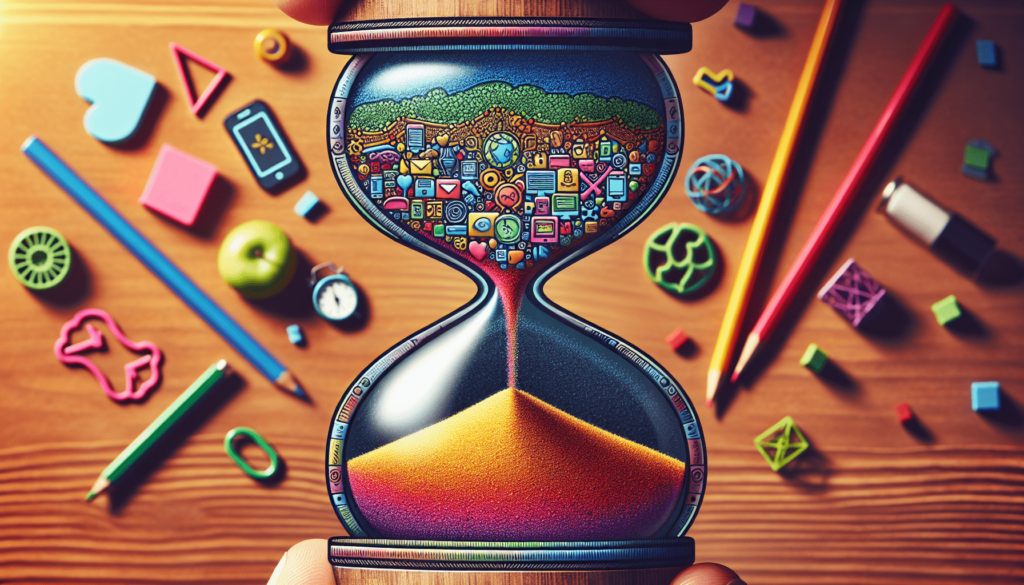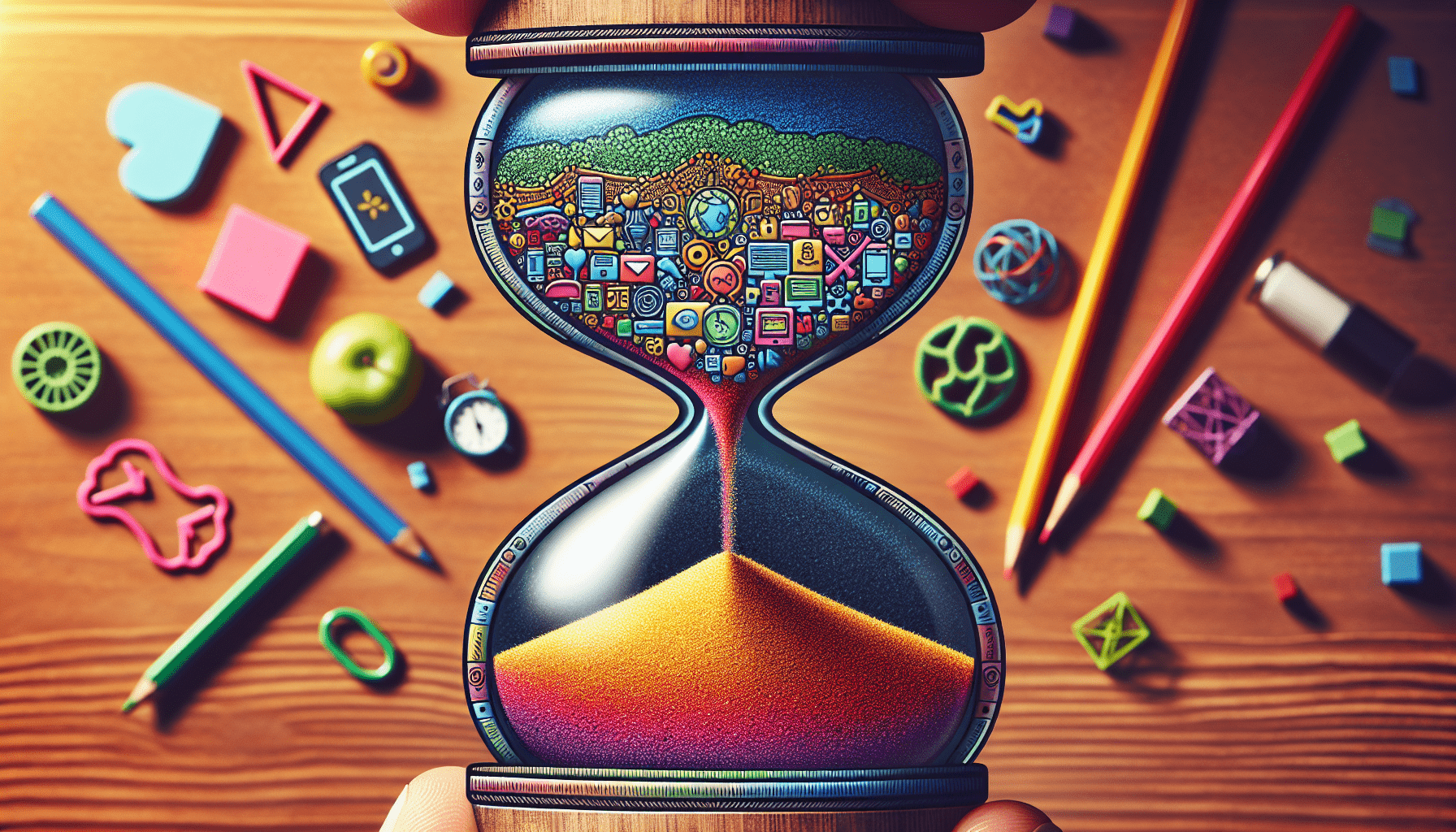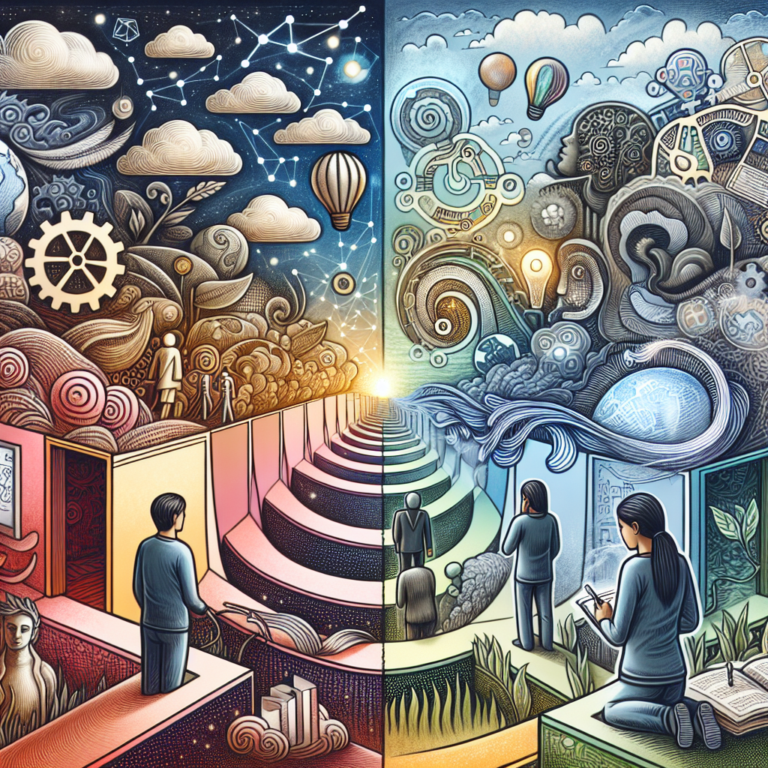The Impact Of Technology On Our Motivation And Attention Span
In today’s digital age, technology plays an increasingly integral role in our lives, shaping not only our daily routines but also our motivation and attention span. As we immerse ourselves in a world filled with smartphones, social media platforms, and endless sources of information, it’s essential to acknowledge the profound impact technology has on our ability to focus and stay motivated. This article explores the ways in which technology influences our motivation levels and attention span, shedding light on both the benefits and drawbacks of our digital reliance. Whether it’s the instant gratification of notifications or the endless distractions at our fingertips, understanding the impact of technology is crucial in navigating this evolving landscape.

Decreased Motivation in Tasks
Constant Distractions
In today’s digital age, it has become increasingly difficult to stay focused and motivated on tasks. The constant presence of technology and the plethora of distractions it brings have a significant impact on our ability to concentrate on the task at hand. Whether it’s the notifications on our smartphones, the temptation to check social media, or the countless entertainment options available at just the click of a button, these distractions can easily divert our attention and hinder our motivation to complete important tasks.
Instant Gratification
Technology has also given rise to a culture of instant gratification. With the ability to access information, make purchases, and receive immediate responses right at our fingertips, we have become accustomed to getting what we want instantly. This culture of immediacy has seeped into our work and personal lives, making it difficult to find motivation in tasks that require time, effort, and perseverance. When we are constantly seeking quick and easy rewards, tasks that require sustained effort can feel daunting and unappealing.
Lack of Persistence
Moreover, the constant availability of distractions and the lure of instant gratification have contributed to a lack of persistence in tackling tasks. Rather than dedicating the necessary time and effort to accomplish a task, we are often quick to give up and move on to something else. This lack of persistence not only hinders our motivation but also prevents us from experiencing the sense of accomplishment and fulfillment that comes from seeing a task through to completion.
Increased Reliance on External Rewards
Gamification
One of the trends that emerged with the rise of technology is gamification. Many apps, websites, and platforms now incorporate gamified elements to attract and engage users. These elements, such as badges, points, and virtual rewards, are designed to tap into our desire for external validation and recognition. While gamification can be a powerful tool to motivate and engage users, it can also promote a reliance on external rewards rather than intrinsic motivation. When we become too focused on earning points or badges, we may lose sight of the intrinsic value of the task itself, leading to a decreased sense of motivation.
Social Media Validation
Social media has become a prominent part of our lives, and with it comes the need for validation and approval from others. The constant exposure to carefully curated posts and the pressure to present a perfect image of ourselves can significantly impact our motivation. We may find ourselves more concerned with garnering likes, comments, and followers rather than engaging in meaningful and fulfilling activities. This reliance on social media validation can undermine our intrinsic motivation and shift our focus from personal fulfillment to seeking external approval.
Extrinsic Motivation
The increased reliance on external rewards and validation has led to a shift in our overall motivation. Instead of being motivated by our own internal drive and satisfaction, we have become more reliant on external factors to keep us going. This extrinsic motivation, whether it’s the promise of praise, rewards, or recognition, is often short-lived and can hinder our ability to stay motivated in the absence of such external incentives. As a result, our overall motivation may suffer, leading to decreased productivity and a lack of enthusiasm in our tasks.
Overwhelming Amount of Information
Information Overload
The rapid advancement of technology has brought with it an overwhelming amount of information. With just a few clicks, we can access vast quantities of data, news, and entertainment. While this access to information has its benefits, it also comes with the challenge of managing and filtering through the immense volume of data. This constant influx of information can lead to information overload, making it difficult to focus on specific tasks and retain the necessary information.
Shortened Attention Span
As we navigate through a sea of information, our attention span has decreased significantly. The constant bombardment of stimuli and the need to quickly process and consume information have trained our brains to constantly seek new and exciting stimuli. This shortened attention span can make it difficult to concentrate on tasks that require sustained focus and attention. We may find ourselves easily getting distracted or switching from one task to another, unable to maintain our attention for extended periods.
Multitasking
In addition to information overload and a shortened attention span, technology has also encouraged multitasking. The ability to juggle multiple tasks simultaneously may seem like a valuable skill, but it often leads to decreased productivity and a lack of focus. When we try to divide our attention between multiple tasks, our ability to fully engage and excel in each task diminishes. This constant splitting of attention can lead to errors, reduced efficiency, and a general decrease in task motivation.

Changes in Cognitive Abilities
Decreased Memory Retention
With the advent of technology, our reliance on digital devices for information storage and retrieval has grown exponentially. Why bother memorizing information when it can be accessed with a few taps on a screen? However, this reliance on technology has led to a decrease in our ability to retain information in our memory. When we no longer need to remember facts, figures, and other details, our memory muscles weaken, hindering our ability to recall information and decreasing our motivation to engage in tasks that require memorization.
Reduced Critical Thinking
Technology has made information readily available, but it has also fostered a culture of passivity in our thinking. Rather than critically analyzing and evaluating information, we are often content with accepting whatever is presented to us without question. The ease of accessing information can lead to a decrease in our critical thinking skills, as we no longer feel the need to actively engage in deep analysis and evaluation. This reduced critical thinking can impact our motivation to dig deeper, question assumptions, and seek alternative perspectives.
Difficulty Focusing
The constant presence of technology and the ever-present distractions it brings have made it increasingly challenging to maintain focus. We may find ourselves easily getting distracted, struggling to concentrate on tasks, and experiencing a lack of mental clarity. This difficulty focusing can significantly impact our motivation as we struggle to stay engaged and present in the task at hand. The constant interruptions and the need to switch between tasks disrupt our flow and hinder our ability to perform at our best.
Dependency on Technology
Overreliance on Digital Tools
Technology has become an integral part of our daily lives, and many of us have become overly reliant on digital tools to perform even the simplest tasks. From relying on navigation apps to find our way around to using calculators for basic arithmetic, our dependency on technology can make us less self-reliant and hinder our motivation to develop essential skills. When we become overly dependent on digital tools, we may lose the drive to learn and improve our abilities, leading to a decreased sense of motivation.
Decreased Self-Initiation
In a world where technology provides answers and solutions instantly, we may lose the initiative to think for ourselves and take the necessary steps to solve problems. When we can easily find answers with a quick search or have tasks automated through smart devices, our motivation to actively explore, think critically, and take initiative diminishes. This decreased self-initiation can hinder our personal growth and development, as well as our motivation to engage in tasks that require independent thinking and problem-solving.
Impaired Problem-Solving Skills
Technology has undoubtedly made our lives more convenient, but it has also had a detrimental effect on our problem-solving skills. The ability to quickly find solutions and answers through technology may satisfy our immediate needs but can hinder our ability to think creatively and develop effective problem-solving strategies. When we rely on technology to provide solutions, our motivation to actively engage in complex problem-solving tasks diminishes, leading to a decrease in our problem-solving abilities and overall motivation.
Negative Effects on Mental Health
Increased Anxiety and Stress
The constant exposure to technology and the barrage of information and stimuli can have a significant impact on our mental health. The pressure to stay connected, keep up with the latest trends, and constantly be available can lead to increased anxiety and stress. The fear of missing out (FOMO) and the constant comparison to others on social media can further exacerbate these feelings. The constant stimulation and the feeling of being constantly “switched on” can make it difficult to relax, unwind, and find motivation in tasks that require calm and focus.
Social Comparison and FOMO
Social media platforms have created a culture of comparison, where we constantly compare ourselves to others and feel the need to compete for attention and validation. This constant comparison can lead to feelings of inadequacy and decreased motivation. When we see others achieving success or living seemingly perfect lives, it can be disheartening and demotivating. Additionally, the fear of missing out (FOMO) that arises from seeing others’ experiences and activities can create a sense of restlessness and distraction, further hindering our motivation to engage in our own tasks.
Isolation and Loneliness
Paradoxically, the increased connectivity that technology provides can also lead to feelings of isolation and loneliness. Despite being more connected than ever, we may find ourselves lacking meaningful connections and genuine human interactions. The constant reliance on digital communication can make it more challenging to establish deep and meaningful relationships, leading to a sense of isolation and loneliness. These feelings can significantly impact our motivation and overall well-being, making it difficult to find joy and fulfillment in our tasks and activities.
Impact on Creativity and Imagination
Lack of Originality
The constant exposure to an overwhelming amount of information and the influence of social media can stifle our creativity and originality. When we are constantly bombarded with ideas and content from others, it can be challenging to tap into our unique perspectives and come up with truly original ideas. Additionally, the pressure to conform to trends and fit into societal expectations can hinder our creative thinking, leading to a lack of motivation to explore new ideas and approaches.
Reduced Creative Thinking
Technology has made many aspects of our lives more convenient, but it has also reduced the need for creative thinking. When tasks can be automated or solved with the click of a button, our motivation to think outside the box and come up with innovative solutions diminishes. This reduced need for creative thinking can hinder our ability to approach tasks with fresh perspectives and limit our motivation to engage in tasks that require creative problem-solving and imaginative thinking.
Limited Imagination
The constant presence of technology and the instant access to entertainment and information have left little room for daydreaming and imaginative thinking. Rather than allowing our minds to wander and explore new ideas and possibilities, we are often consumed by the need for constant stimulation and information consumption. This limited imagination can hinder our motivation to engage in creative tasks and find joy and fulfillment in activities that require active imagination and creative thinking.
Decreased Empathy and Communication Skills
Less Face-to-Face Interaction
The increased reliance on technology for communication has led to a decrease in face-to-face interaction. As we opt for text messages, emails, and social media comments over in-person conversations, we may find it increasingly challenging to empathize with others and effectively communicate. Nonverbal cues such as facial expressions, body language, and tone of voice play a crucial role in understanding and connecting with others, and their absence in digital communication can hinder our ability to empathize and effectively communicate.
Emotional Detachment
The impersonal nature of digital communication can also contribute to emotional detachment. When we communicate primarily through screens and text, it can be difficult to fully convey and understand emotions. Emoticons and abbreviations can only do so much in capturing the nuances of human emotions. This emotional detachment can hinder our ability to build deep and meaningful connections with others and impact our motivation to engage in tasks that require emotional intelligence and empathetic understanding.
Inability to Read Nonverbal Cues
The overreliance on digital communication has also led to a decrease in our ability to read and interpret nonverbal cues. Understanding facial expressions, gestures, and body language is crucial for effective communication, yet these cues often go unnoticed or unacknowledged when communication primarily occurs through digital channels. This inability to read nonverbal cues can hinder our ability to understand others and respond appropriately, impacting our motivation to engage in tasks that require effective communication skills.
Impact on Productivity and Efficiency
Procrastination and Time Mismanagement
Technology, with its myriad of distractions and instant entertainment options, can easily lead to procrastination and time mismanagement. The constant access to social media, online games, and streaming platforms can be irresistible temptations, diverting our attention and eating into valuable time that could be spent on important tasks. This procrastination and poor time management can have a significant impact on our productivity and efficiency, leaving us feeling unmotivated and overwhelmed by unfinished tasks.
Decreased Work Performance
The distractions and constant interruptions that come with technology can significantly impact our work performance. Whether it’s checking emails, attending to instant messages, or succumbing to the allure of social media, these distractions can disrupt our workflow and hinder our ability to concentrate on important tasks. As a result, our work performance may suffer, and our motivation to excel and strive for excellence may diminish.
Distraction from Important Tasks
The constant influx of information and the allure of digital entertainment can easily distract us from important tasks. The temptation to check social media, browse the internet, or indulge in online shopping can easily divert our attention and hinder our progress in tasks that require focus and concentration. This distraction from important tasks not only impacts our productivity but also erodes our motivation to complete these tasks effectively and efficiently.
Potential Solutions and Strategies
Digital Detox and Time Management Techniques
To combat the negative impact of technology on motivation and attention span, implementing a digital detox can be highly beneficial. Setting aside designated periods of time to disconnect from technology can help regain focus, reduce distractions, and increase motivation. Additionally, practicing effective time management techniques such as the Pomodoro Technique can help break tasks into manageable chunks and promote sustained focus and motivation.
Mindfulness Practice
Incorporating mindfulness practices into daily routines can also help counteract the negative effects of technology on motivation and attention span. Mindfulness techniques, such as meditation and deep breathing exercises, can help cultivate focus, increase self-awareness, and reduce stress. By practicing mindfulness, individuals can develop a greater ability to resist distractions, enhance their attention span, and increase motivation in tasks.
Balancing Technology Use
Finding a balance in technology use is crucial in maintaining motivation and attention span. Rather than completely eliminating technology from our lives, it is important to assess and regulate our usage. Setting boundaries and scheduling designated technology-free periods can help create space for focused and motivated work. Moreover, establishing healthy habits such as setting aside specific times to check emails or limiting social media use can prevent technology from becoming a hindrance to productivity and motivation.
In conclusion, the impact of technology on our motivation and attention span cannot be ignored. The constant distractions, instant gratification, overwhelming amount of information, changes in cognitive abilities, dependency on technology, negative effects on mental health, diminished creativity and imagination, decreased empathy and communication skills, and the impact on productivity and efficiency all highlight the need for awareness and proactive measures. By understanding the challenges posed by technology and implementing strategies to mitigate its negative effects, we can maintain and enhance our motivation and attention span in an increasingly digital world.







